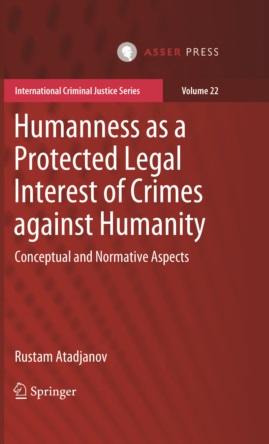
Humanness as a Protected Legal Interest of Crimes against Humanity - Conceptual and Normative Aspects
Series: International Criminal Justice Series
June 2019
Order
Details
- Published: June 2019
- Pages: xxiv + 324 pp., 2 ill.
- Publisher: T.M.C. ASSER PRESS
- Distributor: Springer
- Formats: Hardcover, eBook and online on SpringerLink
- ISBN: 978-94-6265-298-9
- E-ISBN: 978-94-6265-299-6
Central to this book is the concept of humanity in international law. It traces the evolution of that concept within international law, studies the existing theories of crimes against humanity, and lays out its own theory based on an inclusive view of “humanity”. Crimes against humanity are core crimes under international law; their modern definition is found in the Rome Statute. However, their protective scope remains unclear, with the exact meaning of “humanity” left undefined in law.
The proposed theory argues that “humanity” should be understood as “humanness” and crimes against humanity should be criminalised because humanness constitutes these crimes’ valid protected interest. This volume in the International Criminal Justice Series offers an analysis of the German doctrine of Rechtsgut to justify the penalization of crimes against humanity at both domestic and international levels.
This is the first monograph on crimes against humanity written by an author from the Commonwealth of Independent States (CIS) aimed at an international audience, and should constitute a useful tool for academics, students and practitioners of international law.
Rustam Atadjanov, LLB, LLM, Dr.jur., attained his Ph.D. at the University of Hamburg in Germany and is a former Legal Adviser to the Regional Delegation of the International Committee of the Red Cross in Central Asia, Tashkent, Uzbekistan.
Specific to this book:
- Proposes solutions to existing problems regarding the analysis and structure of crimes against humanity by clarifying their protective scope
- Discusses both theoretical and practical aspects of the central issue and puts forward a new comprehensive theory of crimes against humanity which answers concrete and normative questions
- Provides new insights into unresolved legal or philosophical issues related to the concept of humanity in international criminal law
- Provides the first-ever comparative analysis of the protective scopes of crimes against humanity and other core crimes under international law
- Represents a new holistic, systematised as well as inter-disciplinary (law, history, philosophy) academic treatment of the subject
With a foreword by Sergey Sayapin LLB, LLM, Dr.iur., Assistant Professor of International and Criminal Law, School of Law, KIMEP University, Almaty, Kazakhstan
Excerpts from book reviewers:
Atadjanov’s book argues for a broad theory of humanness to describe the protective scope of crimes against humanity. Is this broadness of the theory a weakness? Is the theory too broad to be fit for (criminal law) purposes? I think not. It is indeed the broadness of the protected interest of humanness that elevates and situates crimes against humanity; that helps to counter the insidious and more blatant relativization, as we have seen with reference to the apartheid example, and that helps to explain why a crime like apartheid is, ultimately, a crime against humanity precisely because of the denial of the humanness of its victims.
- Gerhard Kemp, Professor of International Criminal Law, University of Derby, UK
For the full review, published in the Journal of International Criminal Justice (Oxford Academic), 17 March 2021, see: doi:10.1093/jicj/mqab009
The book’s purpose of drawing a doctrinal framework with Rechtsgut is considered to be an essential step for the author to “justify penalization of [CAH – crimes against humanity] at both domestic and international levels” (xiv). The fact that it offers “a first-ever comparative analysis of the protective scopes of CAH and other core crimes under international law” (xiv) is counted among remarkable contributions of the book.
- Ceylin Özyurt, Ph.D. Candidate, Department of Sociology, Middle Eastern Technical University
The correlations between individual acts/types of CAH as contained in the Rome Statute and the elements of humanity (humanness) demonstrate his detailed yet broadly applicable conceptual contribution to the existing literature.
- Ceylin Özyurt, Ph.D. Candidate, Department of Sociology, Middle Eastern Technical University
This is Volume 22 in the International Criminal Justice Series
